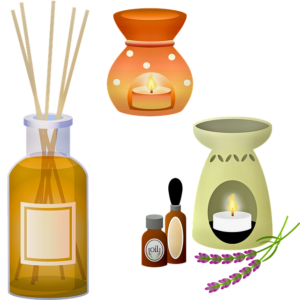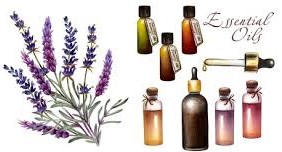Natural remedies are very effective in reducing the effects of stress and restoring the balance of body and mind. They are an enjoyable way of improving well-being and have been used around the world for thousands of years.
Natural Remedies for Relaxation – Aromatherapy
Essential oils distilled from plants, flowers and resins can be used to promote good health and help you relax. Your sense of smell is directly linked to memories and mood (Sense of Smell). Among other things, essential oils can be antidepressant, relieve pain and tension, ease headaches, act as a tonic, and help to ensure a good night’s sleep.
There are few things more relaxing than an aromatherapy massage – the treatment eases muscular tension while treating the senses to the soothing aroma of essential oils.
Oils can be inhaled, used in compresses to relieve pain, added to bathwater or massage oil, or used in a vaporizer.

Natural Remedies for Relaxation – Massage
An aromatherapy massage combines the relaxing properties of various oils with the benefits of touch. Dilute a few drops of two or three essential oils in a carrier oil such as sweet almond or apricot kernel oil, add a little jojoba oil for very dry skins. Blend six drops of essential oil with 15-20ml (4 tsp) of carrier oil to make enough for a full body massage.
Natural Remedies for Relaxation – Baths
Only add neat oils to bathwater if they are guaranteed to be non-irritants, such as Roman chamomile and lavender; otherwise, dilute in a carrier oil. Add five drops then swirl the bathwater around to disperse the oils before stepping into the bath. Oils added to bathwater are inhaled and partly absorbed by the skin, bringing immediate physical benefits.
Natural Remedies for Relaxation – Ten Relaxing Essential Oils
Bergamot (Citrus bergamia): soothing, uplifting and good for tension and depression.
Chamomile (Chamaemelum nobile): calming; suitable for insomnia.
Jasmine (Jasminum Officinale): a stimulant or a sedative, according to need; excellent antidepressant and aphrodisiac.
Juniper (Juniperus communis): good for fatigue and boosting self-esteem.
Lavender (Lavandula angustifolia); a very useful and popular oil, used for relaxing and as an antidepressant and painkiller.
Lemon balm (Melissa officinalis): long used to banish melancholy; balances the emotions.
Rosemary (Rosmarinus officinalis): refreshing and stimulating.
Sandalwood (Santalum album): used as an antidepressant and aphrodisiac.
Vetiver (Vetiveria zizanioides): balances the nervous system; good for insomnia.
Ylang ylang (Cananga odorata): calming; used as an aphrodisiac and good for panic attacks.

Natural Remedies for Relaxation – Vaporization
Filling a room with an aroma of your choice is the easiest way to enjoy essential oils. Add a few drops to a saucer of water and place them on a radiator or on a burner.
Certain oils can improve mood and concentration, and are deeply relaxing.
Cautions
– Always dilute oils before use (although lavender and tea tree can be used neat in first aid situations).
– Some oils are not safe to use in pregnancy.
– Seek professional advice before using essential oils if you have a long-standing medical condition such as heart disease, diabetes or high blood pressure.
– Many oils are not suitable for small children, so check first.
– Some oils react adversely to sunlight.
– Do not use steam inhalations if you have a breathing disorder such as asthma.
– Never take oils internally, unless professionally prescribed.
[/et_pb_text][/et_pb_column] [/et_pb_row] [/et_pb_section]
